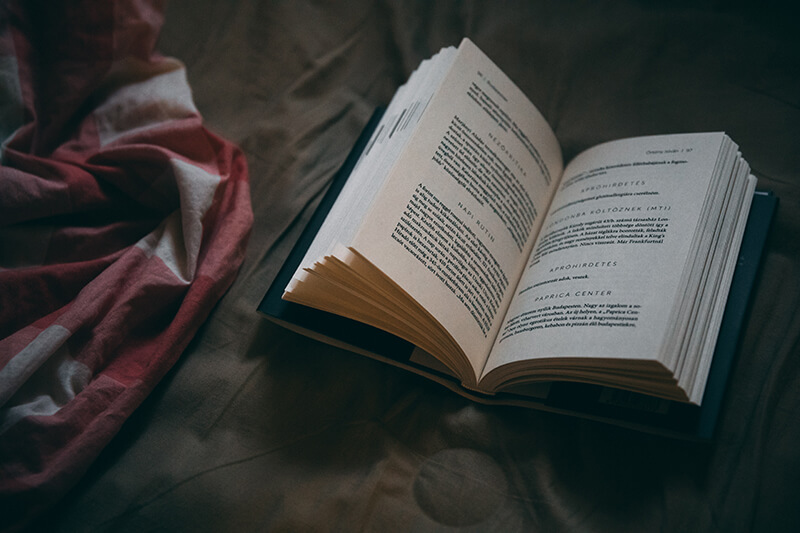
Learn How to Write a Good Book Report For Any University or College Class
 Let’s face it. You’ve probably been writing book reports since elementary school. But learning how to write a good book report for college or university is an entirely different ball game.
Let’s face it. You’ve probably been writing book reports since elementary school. But learning how to write a good book report for college or university is an entirely different ball game.
When you were in elementary school, the book reports you wrote were most likely about youth fiction, such as E.B. White’s Charlotte’s Web. But in post-secondary, you’re going to be writing about more complex novels or even nonfiction textbooks. The rubric will be a lot more complex as well, so you want to make sure you’re getting it right when it comes to your book report.
Need some help? That’s what we’re here for. We’re giving you our top tips for learning how to write a book report. Follow these, and we promise the reward will pay off.

What is a Book Report?
In order to learn how to write a good book report, you need to understand what exactly it is you’re doing. So, we’re going to start with the basics. What exactly is a book report?
A book report, or a book summary, is essentially an analysis of the contents of a book. You’re writing it to show that you fully understood the book. According to the Purdue Writing Lab, your book report should be an informative, objective report discussing the book. Sounds simple enough.
But why am I still doing this in university? This is a question you may be asking yourself as you sit down and try to start this paper. It’s a good question, as you probably thought you were done with book reports once you got to university. But book reports provide a lot of value to your studies, no matter what type of program you’re in.
While they often take a more complex form than the typical book reports you did in elementary or high school, a university or college book report is a way for your professor to review your analytical skills. Writing a book report shows that you understand elements such as contexts, imagery, literary devices, and how they’re used in practice. It also shows that you can identify various concepts and themes within a work of either fiction or nonfiction. This is important because it’s used as an indicator as to whether you’ve really absorbed the course material, and shows your academic growth within that course or your overall program.

The Difference Between a Book Report and a Book Review
It’s important to note that we’re talking about a book report here, which is not to be confused with a book review. These are two different things, and understanding what you’re being asked to write will prevent you from making avoidable mistakes (and losing marks). If you’re assigned a book report, make sure you actually hand in a book report and not a book review talking about why this is your favorite book ever.
As we mentioned above, a book report is an analysis or exploration of a book, or the themes within a book. Its purpose is to show that you understood the context of the book, and it serves as an objective summary. You’re not talking about how much you loved the book or why you don’t like a certain character. Instead, you’re providing a summarized analysis of the author’s work without your personal point of view.
Meanwhile, a book review is an evaluation or critical assessment of the book. In a book review, you’d address the value of the book and your own point of view. Would you recommend this book to your friends or classmates? Explain why or why not. If you didn’t like a specific element or you thought it was a waste of time, this is where you’d discuss that.
So, now that you know what you’re doing, it’s time to actually learn how to write a compelling book report.
https://www.instagram.com/p/Bsd5bg3h1q_/
Before You Start Reading
If you haven’t read the book yet, take notes while you read. Even if you’ve already read the book, it’s a good idea to quickly go through and give yourself a refresher while jotting down highlights. This will be a major help when you start writing your book report because you’ll have the information in front of you instead of having to flip through the book every single time you need to find something.
Use the note-taking techniques you would use in class and apply them while you’re reading. Oxford Learning Center recommends a few different note taking methods tailored to your own learning style. Choose something that works for you and use it.
While you’re reading, look out for vocabulary words, metaphors, and literary devices such as imagery and symbolism. Pay attention to the author’s writing style. Highlight (or jot down) anything you don’t understand, or any terms you think are important that you want to look up later on. If you’re having trouble with this, try using the Feynman Method. Essentially, you take a subject you’re not familiar with, and write down everything you know about it in simple terms, as if you’re teaching it to a child. From there, you can add more research as you go on and learn to simplify it. The best way to show that you truly understand a subject is when you’re able to explain it to someone in the most condensed way.

How to Write a Good Book Report: Fiction
While your assignments can adapt a lot of the same techniques and styles, your book report is going to be a little different when it comes to fiction and nonfiction material. Let’s start with fiction. Here’s what you need to know.
Fiction book reports usually include a discussion of various elements, literary devices, and techniques including (but not limited to):
● Plot
● Imagery
● Symbolism
● Theme
● Characters
● Setting
● Narrative format
Sometimes that book report is based entirely around the use of one of those elements (for example, you could write an entire paper about the use of nature imagery in Mary Shelley’s Frankenstein). But when you’re going for a more broad or general approach, it’s best to try to go over as many of these elements as possible as long as it makes sense in terms of paper length and topic.

I Watched The Movie Instead of Reading the Book. That’s Good Enough For my Book Report, Right?
Wrong. Contrary to what you may believe, your professor can tell when you didn’t read the book. If you leave your book report to the last minute and just watch the movie the night before it’s due, you’ll be in for a shock when you get your mark back.
One of the key reasons you need to learn different tips on writing a good book report is to showcase that you understand the literary devices the author is using and what you can take away from them. You can’t do that if you’re just watching the movie, because you can’t see literary devices like symbolism in the same way you do when you read the book.
Another major problem with using the movie for your book report is within the summary itself. As we all know, movies often tend to leave out various elements of the book, even if they’re important to the story or make the story more understandable. The Harry Potter franchise is a great example of this, as many elements are left out from the films simply because they needed to condense them. It’s hard to take large, detailed, complex works of fiction and pick and choose what gets shown in a two hour time span. Sometimes a movie adaptation may even change the ending entirely, and you’d never realize that if you didn’t read the book. That’s a big risk to take for your book report, especially if it’s worth a heavy percentage of your overall grade.
This is also an issue if you’re writing your book report on a nonfiction book. For example, if you’re writing about a nonfiction book showcasing the use of airplane technology in World War II, you may assume that this information is all history, so it’s common knowledge among many historians, and proceed to look it up on the Internet. However, when historians write books about events that happened, they often include their own point of view or their specific arguments, adding a fresh new perspective on the topic. So, your historian writing about airplanes in World War II may be arguing about a specific impact of this technology and connecting it with something else, which you’d miss in your book report if you didn’t actually read the book.
https://www.instagram.com/p/BtoOel1DUv6/
How to Write a Good Book Report: Nonfiction
Nonfiction book reports can be a little more difficult because you don’t have fictional plots, images, or characters to work with. But you do have a thesis statement, supporting arguments, research, and details.
Similar to what you would do when writing an article summary, a nonfiction book report focuses on the evidence, arguments, and rhetoric the author uses. Consider the author’s objective, and whether they have done an effective job at reaching that objective. In other words, are you convinced? Why or why not? Additionally, consider what contributions this author is making to the field of research or industry.
Here are some potential elements to consider for your nonfiction book report:
● The author’s point of view: What is their main argument or thesis statement?
● Evidence and sources used: Are they reliable? What types of sources are used (primary or secondary)?
● Use of rhetoric: How does the author craft their argument to make it appealing and believable to the reader?
● If it’s a research study, how do the results reflect the author’s hypothesis?
● What new information does the author bring to the table? This is particularly important for books about historical events, popular works of fiction, or other themes that are considered to be common knowledge.
For more information, take a look at our blog on writing an article summary for a detailed, step-by-step guide through this writing process. You can easily adapt our top tips for article summaries to use in your nonfiction book report if you need some more guidance.

Understand What You’re Writing
There are generally three different types of book reports out there. When learning how to write a good book review, it’s essential to understand what you’re writing and which direction you’re going to go.
● Character analysis: A character analysis is a focused exploration of one or a few specific characters in the book. You could talk about how this character follows the hero’s journey, a fatal flaw they may have, or even the purpose of their existence in the story (ideal for non-protagonist characters).
● Theme analysis: When you write a theme analysis, you will explore one or a few specific themes that are central to the work. For example, you could write a theme analysis of madness in William Shakespeare’s Macbeth or racial prejudice in Harper Lee’s To Kill a Mockingbird. When writing a theme analysis, make sure that the theme you choose isn’t too broad and that you can back it up with examples and quotations from the text.
● Plot summary: In a plot summary, you are providing a close analysis of the specific plot of the book itself. Usually, you’d want to relate the plot in terms of its context. Anyone can google the plot summary of a book, so your job is to dig deeper and analyse the story.

Where to Start: The Book Report Outline
Now that you know what kind of book reports there are, let’s get down to business. Start by making a book report outline. Your outline will help guide the paper and keep your writing consistent, organized, and easy to read. Not only that, but starting with an outline makes the entire writing process easier. You’ll know exactly what type of information to include, what quotations to look for, and how to structure the paper.
You’re likely familiar with the typical essay structure: introductory paragraph, body paragraphs, and conclusion. Well, this structure is ideal for your book report format, too.
The introductory paragraph is your way of introducing your reader to your paper and explaining what you’re going to be talking about. Like most introductions, yours should begin with a catchy hook, and move in the typical essay triangle formation – start with general information, then narrow down to details until you reach your thesis. After your hook, write a few sentences with basic book details, starting with the author and the title, and then the setting, time period, or other contextual information. For more of our top tips on writing an essay introduction, check out Episode 69 of The Homework Help Show.
Each body paragraph should focus on one specific topic, theme, or supporting argument. Start the paragraph with an opening statement, provide evidence, explain your position, and then include a closing statement that transitions to the next paragraph.
In the conclusion of your book report, restate your thesis and then include a summary of your arguments in a few sentences. Then, you want to reflect on why this topic is important. Does it tie in with the theme of your course? Why should your reader care about this topic? Don’t present any new information or arguments, but be reflective and think outside the box.
So, now that you know how to write a good book report outline, it’s time to start writing.

The Anatomy of a Great Book Report
Here are some things you should consider when learning how to write a solid book report. We’re going to break this down for you so that you don’t miss out on any of the important parts of your assignment.
A Plot Summary
Your plot summary should be a brief retelling of the main storyline. It’s best to assume that your reader hasn’t read the book, even if everyone in the class is writing about the same one. Sometimes a professor will ask for the plot summary in the introductory paragraph, but most of the time this can be its own body paragraph.
It’s important to keep this summary brief and to the point. Your reader doesn’t need to know every single detail. But they do need to know the important points that connect the story, and they need to have an idea of what you’re talking about throughout your paper. They also need to know who specific characters are if you’re going to be talking about them later on, so you can introduce those characters briefly in the summary section.
Citations and Quotations
When using quotations from the book, make sure you offer an explanation every time you cite something. You need to show the connection between the quote and the theme or point you’re making. This is how you demonstrate that you truly understand the material and you’re not just throwing in quotes wherever they fit. Even if your teacher doesn’t specifically ask for quotations, you should always include at least a few of them, and make sure you cite the author properly.
Formatting
Would it surprise you to know that most students struggle with formatting their assignments? Be careful when making your bibliography or works cited page. These are marks you could lose that can easily be avoided with a basic Google search to make sure you’re doing it right. If your professor doesn’t give you a specific format to use for your book report, stick to MLA, which is the most common formatting style for English and humanities essays.

Questions to Guide Your Book Report
Here are some questions to ask yourself while writing your book report. They will give you some understanding as to what specific details you should include and how you can contextualise the writing.
● What is the author’s point of view?
● Who is the intended audience?
● What contributions does this book make to the specific genre, historical time period, theme, or field of research?
● Is the author’s writing style clear and concise?
● Where and when does the story take place, and why is this important?
When it comes to learning how to write a good book report, answering these questions is essential to your overall analysis. These answers will help you understand the point of the book and why you’re even writing this book report in the first place.
https://www.instagram.com/p/B47-UeeltOH/
What to do When You Hit a Snag in the Writing Process
So you started writing your book report, and then you hit a wall, and now you can’t figure out how to get past that wall. It happens to the best of us. So in teaching you how to write a good book report, we’re also going to teach you what to do when you hit writer’s block along the way.
Revising and editing is an essential part of the writing process. But you don’t always need to wait until you’re done to do this. Revising your writing before you’re finished is an effective way to pick up where you got stuck. Take a little break, and then come back to read over what you have written so far. Does it make sense? Where could you expand on your ideas?
When all else fails, do a quick Google search to see what other people are saying about your book. This might give you a fresh new perspective to look at and some new ideas you may not have noticed before. However, do not copy this information directly or steal their words. Do your own research and connect it back to the book.

Not Feeling it? We’re Here to Help.
If you just can’t fathom sitting down and writing your book report, it’s time to bring in some help. An essay writing service can help you write your book report, or edit it for you to make sure you’re on the right track.
Instead of trying to figure out how to write a good book report and then risking your mark, leave it to the professionals at Homework Help Global. We have an internal team of over 50 academic writers who have written plenty of book reports throughout their educational careers. When you don’t have the time or energy to handle your assignments, we’re here for you, and we’re more than capable of getting the job done in the highest quality possible.
Get a free quote now to get connected with one of our top writers and we’ll get started on your book report.
Share:

